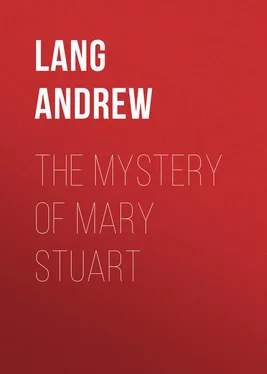Andrew Lang - The Mystery of Mary Stuart
Здесь есть возможность читать онлайн «Andrew Lang - The Mystery of Mary Stuart» — ознакомительный отрывок электронной книги совершенно бесплатно, а после прочтения отрывка купить полную версию. В некоторых случаях можно слушать аудио, скачать через торрент в формате fb2 и присутствует краткое содержание. Жанр: foreign_antique, foreign_prose, на английском языке. Описание произведения, (предисловие) а так же отзывы посетителей доступны на портале библиотеки ЛибКат.
- Название:The Mystery of Mary Stuart
- Автор:
- Жанр:
- Год:неизвестен
- ISBN:нет данных
- Рейтинг книги:4 / 5. Голосов: 1
-
Избранное:Добавить в избранное
- Отзывы:
-
Ваша оценка:
- 80
- 1
- 2
- 3
- 4
- 5
The Mystery of Mary Stuart: краткое содержание, описание и аннотация
Предлагаем к чтению аннотацию, описание, краткое содержание или предисловие (зависит от того, что написал сам автор книги «The Mystery of Mary Stuart»). Если вы не нашли необходимую информацию о книге — напишите в комментариях, мы постараемся отыскать её.
The Mystery of Mary Stuart — читать онлайн ознакомительный отрывок
Ниже представлен текст книги, разбитый по страницам. Система сохранения места последней прочитанной страницы, позволяет с удобством читать онлайн бесплатно книгу «The Mystery of Mary Stuart», без необходимости каждый раз заново искать на чём Вы остановились. Поставьте закладку, и сможете в любой момент перейти на страницу, на которой закончили чтение.
Интервал:
Закладка:
Most inscrutable of the persons in the play is Bothwell’s wife, Lady Jane Gordon, a daughter of Huntly, the dead and ruined Cock of the North. If we may accept the Casket Sonnets, Lady Jane, a girl of twenty, resisted her brother’s scheme to wed her to Bothwell. She preferred some one whom the sonnet calls ‘a troublesome fool,’ and a note, in the Lennox Papers, informs us that her first love was Ogilvy of Boyne, who consoled himself with Mary Beaton. Still following the sonnets, we learn that the young Lady Bothwell dressed ill, but won her wild husband’s heart by literary love letters plagiarised from ‘some illustrious author.’ The existing letters of the lady, written after the years of storm, are businesslike, and deal with business. She consented to her divorce for a valuable consideration in lands which she held till her death, in the reign of Charles I. According to general opinion, Bothwell, as we shall see, greatly preferred her to the Queen, and continued to live with her after the divorce. Lady Bothwell kept the dispensation which enabled her to marry Bothwell, though he was divorced from her for the want of it. She married the Earl of Sutherland in 1573, and, after his death, returned à ses premiers amours , wedding her old true love who had wooed her in her girlhood, Ogilvy of Boyne. Their conversation must have been rich in curious reminiscences. The loves and hatreds of their youth were extinct; the wild hearts of Bothwell, Mary, Mary Beaton, Lethington, Darnley, and the rest, had long ceased to beat, and these two were left, Darby and Joan, alone in a new world.
II
THE MINOR CHARACTERS
Having sketched the chief actors in this tragedy, we may glance at the players of subordinate parts. They were such men as are apt to be bred when a religious and social Revolution has shaken the bases of morality, when acquiescence in theological party cries confers the title of ‘godly:’ when the wealth of a Church is to be won by cunning or force, and when feudal or clan loyalty to a chief is infinitely more potent than fidelity to king, country, and the fundamental laws of morality. The Protestants, the ‘godly,’ accused the Idolaters (the Catholics) of throwing their sins off their shoulders in the confessional, and beginning anew. But the godly, if naturally ruffians, consoled and cleared themselves by repentances on the scaffold, and one felt assured, after a life of crime, that he ‘should sup with God that night.’
The Earl of Morton is no minor character in the history of Scotland, but his part is relatively subordinate in that of Mary Stuart. The son of the most accomplished and perfidious scoundrel of the past generation, Sir George Douglas, brother of Angus the brother-in-law of Henry VIII., Morton had treachery in his blood. His father had alternately betrayed England of which he was a pensioner, and Scotland of which he was a subject. By a perverse ingenuity of shame, he had used the sacred Douglas Heart, the cognisance of the House, the achievement granted to the descendants of the Good Lord James, as a mark to indicate what passages in his treasonable letters might be relied on by his English employers. In Morton’s father and uncle had lived on the ancient inappeasable feud between Douglases and Stewarts, between the Nobles and the Crown. It was a feud stained by murder under trust, by betrayal in the field, and perfidy in the closet. Morton was heir to the feud of his family, and to the falseness. When the Reformation broke out, and the Wars of the Congregation against Idolatry, Morton wavered long, but at length joined the Protestants when they were certain of English assistance. Henceforth he was one of Mr. Froude’s ‘small gallant band’ of Reformers, and, as such, was hostile to Mary. His sanctimonious snuffle is audible still, in his remark to Throckmorton at the time when the Englishman probably saved the life of the Queen from the Lords. Throckmorton asked to be allowed to visit Mary in prison: ‘The Earl Morton answered me that shortly I should hear from them, but the day being destined, as I did see, to the Communion, continual preaching, and common prayer, they could not be absent, nor attend matters of the world, but first they must seek the matters of God, and take counsel of Him who could best direct them.’
A red-handed murderer, living in open adultery with the widow of Captain Cullen, whom he had hanged, and daily consorting with murderers like his kinsman, Archibald Douglas, the Parson of Glasgow, Morton approached the Divine Mysteries. His private life was notoriously profligate; he added avarice to his other and more genial peccadilloes. He intruded on the Kirk the Tulchan Bishops, who were mere filters, or conduits, through which ecclesiastical wealth flowed to the State. Yet he was godly: he was the foe of Idolaters, and the Kirk, while deploring his excesses, cast on him no unfavourable eye. He held the office of Chancellor, and, during the raids and risings which were protests against Darnley’s marriage with Mary, he was in touch with both parties, but did not commit himself. About February, 1566, there seems to have been a purpose to deprive him of the Seals. He seized the moment to join hands with Darnley in antagonism to Riccio: he and his Douglases, George and Archibald, helped to organise the murder of the favourite: Morton was then driven into England. At Christmas, 1566, after signing a band, not involving murder, against Darnley, he was pardoned, returned, was made acquainted with the scheme for killing Darnley, but, he declared, declined to join without Mary’s written warrant. His friend and retainer, Archibald Douglas, was present at the laying of gunpowder in Kirk o’ Field. Morton presently signed a band promising to aid and abet Bothwell, but instantly joined the nobles who overthrew him. His retainers discovered the fatal Casket full of Mary’s alleged letters to Bothwell, and he was one of the most ardent of her prosecutors. Vengeance came upon him, fourteen years later, from Stewart, the brother-in-law of John Knox.
In person, Morton was indeed one of the Red Douglases. A good portrait at Dalmahoy represents him with a common but grim set of features, and reddish tawny hair, under a tall black Puritanic hat.
A jackal constantly attendant on Morton was his kinsman, Archibald Douglas, a son of Douglas of Whittingham. In Archibald we see the ‘strugforlifeur’ (as M. Daudet renders Darwin) of the period. A younger son, he was apparently educated for the priesthood, before the Reformation. In 1565, he was made ‘Parson of Douglas,’ drawing the revenues, and also was an Extraordinary Lord of Session. Involved in Riccio’s murder, he fled to France (where he may have been educated), but returned to negotiate Morton’s pardon. He was go-between to Morton, Bothwell, and Lethington, in the affair of Darnley’s murder, and was present at, or just before, the explosion, losing one of his embroidered velvet dress shoes, in which he had perhaps been dancing at Bastian’s marriage masque. He was also a spectator of the opening of the Casket (June 21, 1567), and so zealous and useful against Mary, that, after her defeat at Langside, he received the forfeited lands of the Laird of Corstorphine, near Edinburgh. In 1568 he became an Ordinary, or regular Judge of the Court of Session, and, later obtained the parish of Glasgow. The messenger of the Kirk, who came to bid him prepare his first sermon, found him playing cards with the Laird of Bargany. He had previously been plucked in the examination for the ministry: this was his second chance. Being examined he declined to attempt the Greek Testament; and requested another minister to pray for him, ‘for I am not used to pray.’ His sermon was not thought savoury. After Morton became Regent, Archibald, for money, took the Queen’s side, and is accused of an ungrateful and unclerical scheme to murder his cousin, Morton. Just for the devilry of it, and a little money, he was intriguing, a traitor to Morton, his benefactor, with Mary’s party, and also acting as a spy for Drury and the English. He was, later, restored to his place on the Bench of Scottish Themis, crowded as it was with assassins, but he fled to England when Morton was accused and dragged down by Stewart of Ochiltree (1581). Morton, in his dying declaration, remembered his grudge against Archibald or for some other reason freely confessed his iniquities. Archibald had distinguished himself as a forger of letters intended to aid Morton, but was denounced by his own brother, also a judge, Douglas of Whittingham. The later career of this accomplished gentleman was a series of treacherous betrayals of Mary. In England his charm and accomplishments recommended him to the friendship of Fulke Greville, who did not penetrate his character. His letters reveal a polished irony. He was for some time ambassador of James VI. to Elizabeth, was again accused of forgery, and, probably, ended his active career in rural retirement. History sees Archibald in the pulpit, a Stickit Minister: on the Bench administering justice: hobbling hurriedly from Kirk o’ Field in one shoe; watching the bursting open of the silver Casket; playing cards, spying, dancing, and winning hearts, and forging letters: a versatile man of considerable charm and knowledge of the world. His life, after 1581, is a varied but always sordid chapter of romance.
Читать дальшеИнтервал:
Закладка:
Похожие книги на «The Mystery of Mary Stuart»
Представляем Вашему вниманию похожие книги на «The Mystery of Mary Stuart» списком для выбора. Мы отобрали схожую по названию и смыслу литературу в надежде предоставить читателям больше вариантов отыскать новые, интересные, ещё непрочитанные произведения.
Обсуждение, отзывы о книге «The Mystery of Mary Stuart» и просто собственные мнения читателей. Оставьте ваши комментарии, напишите, что Вы думаете о произведении, его смысле или главных героях. Укажите что конкретно понравилось, а что нет, и почему Вы так считаете.












